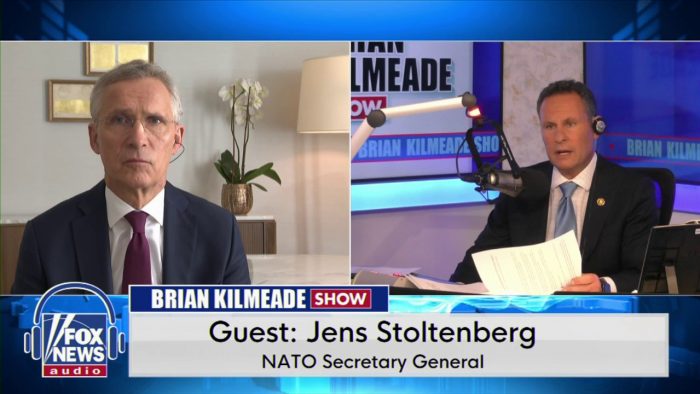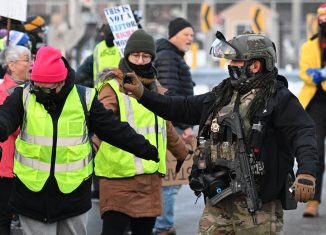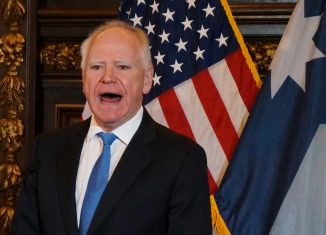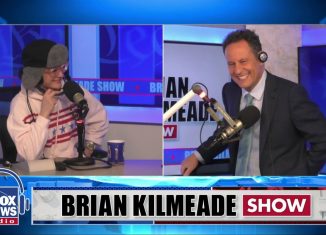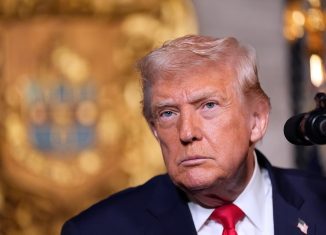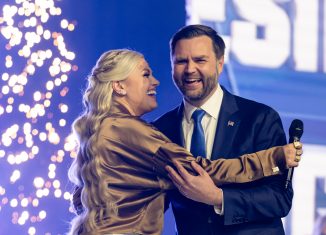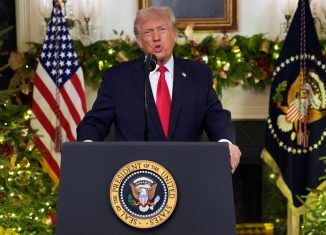Secretary General of NATO Jens Stoltenberg spoke to Brian Kilmeade to discuss the dangers of the Russian-North Korean alliance and how a Russian win in Ukraine is dangerous for us all. Stoltenberg quoted Japanese Prime Minister Fumio Kishida who said, “What happens in Ukraine today can happen in Asia tomorrow.” Stoltenberg also spoke about the need to make sure China, the main supporter of the Russian war effort, cannot have it both ways by continuing their normal trade relationships with European and NATO allies while continuing to fuel the biggest, most dangerous war not seen on the European continent since WWII.Stoltenberg addressed Russian sabotage of NATO allies, explaining how sharing of intelligence between NATO allies has helped prevent some of the sabotage. Stoltenberg pointed to several arrests in the United Kingdom, Poland, Germany and other European countries coupled with Russian diplomats that have been expelled from NATO territory. Stoltenberg says if China continues to be the main provider of dual use equipment being used by Russia against Ukraine, NATO will have to made decisions on economic sanctions on China. When asked about any frustrations he has with the U.S., Stoltenberg responded by saying he would like to see the United States recognize even more clearly that a strong NATO is not only good for Europe but it’s also very good for the United States – it makes the United States safer. Stoltenberg was also asked if he thinks the US will stay in NATO if Donald Trump becomes president again. Stoltenberg says he is confident, regardless of the outcome of the election, the U.S. will continue to be a strong NATO ally because it is in the interest of the United States. Stoltenberg added, the main criticism from former President Trump was not primarily against NATO, it was against NATO allies not spending enough of their GDP on defense spending. Stoltenberg believes the good news is NATO is doing exactly what Trump has wanted as spending on defense among NATO allies is at a record high.
Rough transcript:
Brian Kilmeade [00:00:00] Hi, we are back and it’s my pleasure to bring in Secretary General of NATO, John Stoltenberg, whose tenure is about to come to a close voluntarily. He was asked to stay on another year because no one could agree on a successor. And most everybody agreed he was doing a great job. And now NATO is never has been tested like no other time before. And are they responding? Are they up to the challenge primarily coming from Russia and their new best friends? Mr. Secretary, welcome back.
Jens Stoltenberg [00:00:26] Thanks so much for having me.
Brian Kilmeade [00:00:28] Mr. Secretary, what’s your reaction to President Putin’s visit? Alliance. Military arrangement with North Korea?
Jens Stoltenberg [00:00:37] It demonstrates once again that authoritarian powers like a shot North Korea are more and more aligned. And that also applies for, China and Iran, which are now, strongly supporting President Putin’s, war aggression against the Ukraine. So it demonstrates that what happens in Ukraine is not only about Europe and Ukraine, it’s about, Asia. So if, if Putin wins in Ukraine, it will also be a win for North Korea, and not least for Beijing and and China.
Brian Kilmeade [00:01:10] Ukraine might have won already if North Korea didn’t provide the artillery and Iran didn’t provide the drones, and China the. Do you dual use weaponry? What can you do about this?
Jens Stoltenberg [00:01:22] First of all, it’s important that we ensure that they don’t win because in Ukraine, because that’s the test. They want us to fail, the US to fail, NATO to fail in the in Ukraine. And that would be a tragedy for the Ukrainians. But it will also be dangerous for all of us. And and as the Japanese prime minister said some months ago, is that what happens in Ukraine today can happen in Asia, tomorrow. So Ukraine, the war in Ukraine is, is about much more than just the Ukraine. I think the main message to China, which is the main supporter of the Russian war effort, is that they cannot have it both ways. They cannot continue their normal trade relationships, with, European, NATO allies, continue to fuel the biggest and most dangerous war we have seen on the European continent, since the Second World War. So, at some stage there has to be some consequences for trade and economic relations.
Brian Kilmeade [00:02:16] Mr. Secretary, one thing you could do is rally the European markets, as well as the American market, to start hitting them, with trade relations and hit them with tariffs and, and restrict some of their goods. They would they recognize economic threats. Correct. Would you, do you think NATO is on the same page with this? Would you would they would you encourage that?
Jens Stoltenberg [00:02:38] Well, I made it clear that, unless China’s behavior doesn’t change, and if China continues to be the main provider of, dual use equipment, microelectronics, microprocessors, which are used to build the drones, the bombs, the missiles that, Russia is using against Ukraine, then it has to have a cost. It’s too early for me to say exactly what allies, will be able to agree to, and it will not be NATO as an organization that will make decisions on economic sanctions. That’s for individual allies, the United States, Canada, but also that, European allies, many of them, part of the European Union. But NATO is a platform, for allies to raise this issue. And I raised the issue that the there has to be cost consequences for China. If they continue, it.
Brian Kilmeade [00:03:25] Would certainly help. You announced this week that 23 nations are hitting their 2% spending on their defense GDP. The nations, that have joined that 2%, and the ones that have now, who are the ones that have not yet.
Jens Stoltenberg [00:03:40] Well, there are some allies. That’s, Spain. Italy, and, and and Canada. And it’s a this is a publicly so everyone can they can go to NATO’s homepage and the and the and and see those allies. But the big thing is that NATO allies together in total has delivered. If you take in, in defense spending across Europe and Canada, they are actually now spending 2% in total, of GDP. On defense, when we made the pledge to increase defense spending, back in 2014, only three out of all that our allies spent, a 2% or more on defense. Now it’s actually 23. This is record high. And it demonstrates that, actually, European allies are seriously stepping up delivering what they promised. And, and, and the United States is, although some allies are spending more as a percentage of GDP, on defense, Dundee, United States. So this is really good news. U.S. is not carrying the burden alone. Allies are stepping up.
Brian Kilmeade [00:04:43] Yeah. And Poland actually spends more percentage on their GDP than anybody else. But, Mr. Secretary, what about this? Russia is working behind the scenes, surreptitiously convert covertly to hurt, to hurt NATO members. Whether it’s through elections, whether it’s through some cyber attacks or something else. So far, we haven’t had innocent people die. But that seems to be Putin’s objective. How do you handle a more aggressive, more, complex Vladimir Putin?
Jens Stoltenberg [00:05:12] Well, we have imposed, a lot of, we have implemented many actions to counter Russia’s, hostile acts against the NATO allies. This is part about identifying what is going on. So better intelligence sharing intelligence is important. And the sharing of intelligence between NATO allies have actually helped to prevent some of the sabotage. Also the actions that the Russian security services have planned against NATO allies. There have been several arrests, in the United Kingdom, Poland, Germany and other European countries and also, Russian security, operatives and the diplomats have been expelled from NATO territory. So is sharing intelligence, taking legal actions, and also expelling, people who are actually also responsible for hostile actions are among the actions we have been taken to protect ourself against, these, malign activities of Russian, operatives.
Brian Kilmeade [00:06:12] Would you frustration with the U.S.? How would you if I could, if you can prove anything with their role in NATO, what would it be?
Jens Stoltenberg [00:06:21] Well, the United States, is by far the biggest NATO ally. And, and I’m confident that not the states will remain a strong, NATO ally. I think the only thing I would like to see is that the United States recognize even clearer that a strong NATO is not only good for Europe, it’s also very good for the United States. It makes the United States safer. NATO, United States has something no other power has. Russia and China has nothing like that. More than 30 friends and allies. The United States is 25% of the world’s economy. Together with NATO allies, you are 50% of the world economy and 50% of the world’s military. So NATO makes the United States, stronger and more capable of dealing, for instance, with China and the security challenges, China’s boasting totals.
Brian Kilmeade [00:07:12] Do you have any doubt if President Trump is to win the next election, that he’d want to stay in NATO?
Jens Stoltenberg [00:07:19] I’m confident that, regardless of the outcome of the U.S. elections, the U.S will continue to be, a strong NATO ally again because it is in the interest of the United States, but also because the main criticism from former President Trump was actually not primarily against NATO. It has been against NATO allies not spending enough on NATO. And the good news is that that’s exactly what NATO allies now are doing. They have significantly stepped up record high, increase in defense spending, 18% this this year, and 23 allies, at 2%, and many, actually quite, significant, about 2%. So this is good news. Allies are stepping up.
Brian Kilmeade [00:08:01] So it looks like, Dutch Prime Minister Mark Rutte, who visited Joe Biden the other day, who visited with Joe Biden in the past. And I guess he had to win over Romania. He was asked twice before, the third time, he actually looks like he’s going to get the job. Is he going to be your successor? And how do you view Mark Rutte?
Jens Stoltenberg [00:08:20] So I expect, the formal decision to be made next week. And I welcome, the selection of a marker to very much. Here’s a good friend, a good colleague. I work with him for many years. Also, when I was prime minister of Norway and he was the prime minister of the lands, and, and he knows NATO well, and he’s a strong supporter. Of the transatlantic bond Europe and North America together. And, he will be a perfect. Secretary general of NATO. So my focus now is on the preparations for the upcoming NATO summit in Washington next month. And then I’m looking forward to hand over, the responsibilities to him on the 1st of October, later this year.
Brian Kilmeade [00:08:57] Is this the most dangerous? You felt the world was since you got the job, number one. And maybe since the alliance was birthed.
Jens Stoltenberg [00:09:07] Is very hard to compare, for instance, the Cuban Missile Crisis with what we see now. But I think it’s correct to say that it’s it’s more dangerous and more complex and more unpredictable than it has been for decades. And that’s it makes it just even more important that we stand together, North America and Europe. But no one can tell exactly what will the next crisis will or the next to be. But what we can say with certainty is that as long as we stand together, we will prevail. We will, be able to defend and protect all eyes and and prevent a military attack on NATO because we are by far, the strongest military force in the world when put North America and Europe together.
Brian Kilmeade [00:09:44] Well, by all accounts, you did a fantastic job. I mean, people, praise you up and down, and, you did a great job of not being, to one party or the next. Thanks so much, Mr. Secretary, for your time today.
Jens Stoltenberg [00:09:58] Thanks so much for having me.
Brian Kilmeade [00:09:59] You got it. NATO is being tested, and I hopefully the strength is there for them to prevail.


